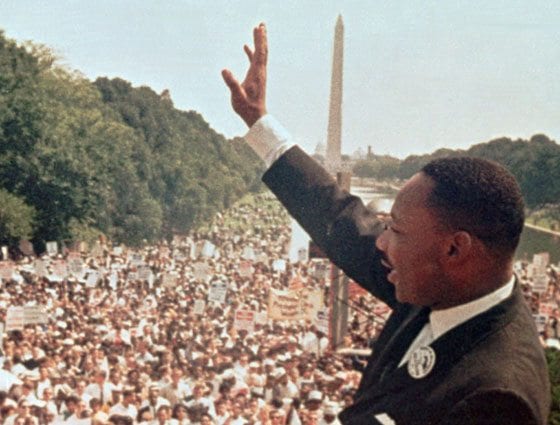
Today would have been the Rev. Martin Luther King Jr.’s 80th birthday. Five days from now, the nation will celebrate as Barack Obama is inaugurated our nation’s 44th — and first African American — president. Many of us cannot help but marvel at the juxtaposition of these two milestones. How proud, and perhaps astonished, Dr. King would have felt as he watched Obama take the oath of office. How tempting it is for us to pronounce that, indeed, we have now all been to the mountaintop. Like Dr. King on the night before his assassination, we have “looked over … and seen the promised land.”
As we commemorate Dr. King’s 80th birthday, it is time to take a more careful look at his life and legacy, and not to simply focus on those aspects most often celebrated.
It is well known that he gave the famous speech to what was then the largest crowd ever to converge on Washington, D.C., on Aug. 28, 1963, during the March on Washington. While that speech is famously called the “I Have a Dream” speech, such a name is far too narrow — the address was in fact about much more, and illustrates the complexity of King’s life. We know he wrote several books, including “The Measure of a Man,” “Strength to Love” and “Why We Can’t Wait,” and received his Ph.D. in 1955 at the young age of 29 from Boston University. We know that he became the youngest recipient of the Nobel Peace Prize when he received it in 1964 at the age of 35.
But these awards do not begin to encompass the breadth and depth of King’s extraordinary accomplishments. In order to do that, we must look more carefully at the struggles he endured and the challenges he faced, which ultimately led to the transformation of America and the world.
Dr. King was an inspirational young minister and a brilliant theologian. Nevertheless, he continued his mission on behalf of the people without the need for a title or accolades. A little more than a year after the historic Brown v. Board of Education decision on May 17, 1954, Dr. King was thrust into leading the boycott that resulted from news of Rosa Parks’ arrest for refusing to give up her seat on the bus to a white person in Montgomery, Ala. Few people recall that King organized thousands of African Americans to change their habits and livelihood and to refuse to take Montgomery’s public transportation for more than a year. It was a bold move by a young preacher who was only 25 years old, but it exemplified his greatness.
Dr. King’s willingness to speak truth to power was evident in so many different ways. When he decided to give the “I Have a Dream” speech, it was in spite of objections from both President John F. Kennedy and Vice President Lyndon B. Johnson. After King’s rousing address, the world began repeating, and continues to repeat, the inspirational portion of his discourse where he discusses his dream for the future of America.
And yet, little attention is given to the stern words that began that speech, where he talked about the problems of segregation, police brutality and poverty in America, and insisted we respond to the “urgency of now.” Although he called very explicitly for a calm and peaceful reaction to the discriminatory policies that African Americans had suffered for years, he made clear that African Americans were not going to sit back any longer and tolerate further discrimination and abuse.
But, of course, the facts tell us that the story of the fight against racial discrimination is far from complete. Despite the wishful thinking of our political punditry, the United States has not yet attained a state of post-racial nirvana.
Our neighborhoods and schools remain stubbornly segregated and unequal. The gap between the opportunities afforded to white children and those provided to children of color in so many of our communities is vast. The average white family continues to benefit from education and income levels significantly higher than the average black or brown family. Incarceration rates of black men are so astronomical that, in the words of sociologist Bruce Western, they threaten to eliminate many of the “gains to African American citizenship hard won by the civil rights movement.” Individuals of color die, on average, several years younger than whites. They also suffer disproportionately from asthma, heart disease and a host of other medical conditions, and often receive inadequate and substandard health care treatment.
It is clear that, if the “promised land” is now within our sights, we still have a long, upward slog ahead in order to arrive there.
And yet, we should not underestimate the enormity of this historic moment, or the magnificence of what the American people accomplished during the presidential campaign of 2008. As a candidate, Obama cobbled together an impressive majority of voters — black, brown and white; rural, urban and suburban; male and female; young and old — who crossed all socioeconomic lines. He was not just a favorite in the “blue” Coastal states. He triumphed in Southern and Midwestern states like North Carolina, Virginia, Indiana, Florida and Ohio. Forty — or even five — years ago, few, if any, would have predicted that these states might provide the margin of victory to a black man running for president.
Whites voted for Obama in record numbers. In the process, many had to confront, and ultimately reject, their own lingering racial prejudices and fears. The much-ballyhooed “Bradley effect” never materialized in the privacy of the voting booth; nor did the violence that so many feared would erupt on the campaign trail.






